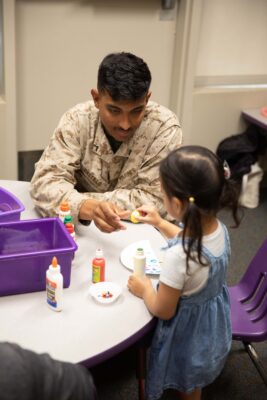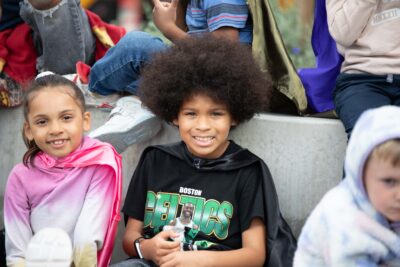Growing Up in Camouflage: A Military Childhood
Written by Kalyn Love
When I sat down to talk with my younger sister Brooklynn — or “Brooke,” as we call her — I knew this conversation would feel different. Brooke is in her second year of college, away from the constant rhythm of military life that shaped so much of our childhood. But as we spoke, it was clear: the impact of growing up in a military family doesn’t just fade — it becomes a part of who you are.
And we’re not alone — nearly 1.6 million U.S. children1 have at least one parent serving in the military today, each carrying their own version of this experience.
While we shared the same home and the same Army dad, we often processed things differently. I entered adulthood and married into the military myself; Brooke is navigating civilian life while carrying the resilience she earned growing up in a military household.
Our conversation centered around the theme of resilience through absence — something both of us know too well.
“It wasn’t just missing birthdays. It was missing routines. Normalcy. Him just being there.”

When I asked Brooke what she remembered most about our dad’s deployments, her answer was immediate.
“It wasn’t just missing birthdays,” she said. “It was missing routines. Normalcy. Him just being there.”
Our dad was gone more than he was home. First as a drill sergeant, then through deployments and endless training. Brooke remembered getting used to the empty chair at dinner and the unpredictable schedule that left no room for stability.
“It made me grow up quicker,” she said. “I got used to not asking when he’d be back. I just learned to keep going.”
Despite the emotional weight of those years, Brooke credits that lifestyle with shaping her adaptability.
“Moving, starting over — it makes you flexible,” she added. “I can walk into a new class or job and just figure it out.”
Her story reminded me how often military kids are expected to be strong without fully understanding what they’re carrying. They pack up their lives, say goodbye over and over, and build an invisible kind of armor. And yet, beneath all that strength is a longing for stability — for someone to simply be there.
A Shared Strength, A New Lens
As a military spouse, I’ve experienced that same kind of absence — waiting for my husband to return from field training, deployment, or late-night shifts. Hearing Brooke speak about our childhood reminded me how those early experiences prepared us, in very different ways, for the lives we now lead.
Now I juggle solo parenting and calendar planning around Temporary Duty (TDY). Brooke is figuring out adulthood with the echoes of a life lived in transition.
Her perspective gave me a renewed appreciation for the quiet, uncelebrated strength military kids carry — and how it continues to shape them long after they’ve left home.
Home Is Where the Resilience Is
As our conversation wound down, Brooke said something that stayed with me:
“We didn’t have a normal childhood, but I think it made us closer. We knew we were all in it together.”
That’s what military life is — a kind of shared strength. Whether you’re the spouse, the child, or the one wearing the uniform, this lifestyle shapes you. And through every challenge, absence, and return, we build a version of home that’s rooted not just in place, but in each other.
Support Where It Counts — ASYMCA’s Mission
Talking with Brooke also made me reflect on the kind of support we didn’t have growing up — the emotional tools that could have helped us name what we were feeling. That’s why programs like the Armed Services YMCA (ASYMCA’s) Operation Hero matter so much.
Operation Hero is a free after-school program that helps military children build confidence, develop emotional resilience, and connect with others going through similar challenges. It validates what so many military kids silently experience: that it’s okay to miss your parent, to feel lost, and to need support.
And the need is real. Military children often face higher rates of emotional stress and instability — studies show that nearly 1 in 5 receive a mental health diagnosis within a year2, and 32% of those assessed for suicide risk in DoD schools are categorized as moderate risk3. Through it all, organizations like ASYMCA are stepping up. In the past year alone, ASYMCA served over 363,000 military-connected individuals, delivering 1.5 million points of service, with more than 338,000 youth enrolled in education and skill-building programs.
ASYMCA’s child and youth programs go beyond just after-school help. Their Operation Camp gives military kids a place to be kids — surrounded by peers who understand their world. Early Learning Readiness programs help younger children build healthy social and academic foundations before they start school — a critical support for constantly moving families.
And for those moments of deployment and separation, ASYMCA offers deployment support services that help children and caregivers stay connected and emotionally grounded, even when a parent is far away.
Sometimes I wonder how different things could have been for Brooke and me if we’d had that kind of community — someone to say, “Hey, it’s okay to feel this way.”
Be the Support You Wish You Had
Military life demands strength — especially from the youngest members of the family. ASYMCA’s youth programs provide the emotional support and connection so many military children quietly need. Through mentorship, peer connection, and confidence-building activities, ASYMCA helps kids navigate the unique challenges of military life with resilience and hope.
But this work is only possible with community support. Your donation can make a real difference — helping provide safe, supportive spaces where military kids feel seen, heard, and understood.
Sources:
1The State of Military Families – https://missionrollcall.org/veteran-voices/articles/the-state-of-military-families
2Mental Health Outcomes Associated with Risk and Resilience Among Military-Connected Youth – https://www.heroeswelcome.alabama.gov/wp-content/uploads/2022/09/Family-Process-2020-Sullivan-Mental-Health-Outcomes-Associated-with-Risk-and-Res.pdf
3Supporting Students’ Mental Health and Special Education Needs in DoD Schools – https://www.gao.gov/blog/supporting-students-mental-health-and-special-education-needs-dod-schools

